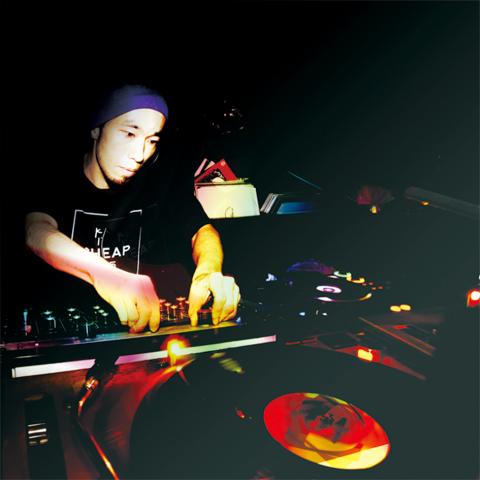In a culture where you’re expected to study for more hours every day than you sleep, it takes a lot of determination and some serious time management skills to follow your dreams. DJ Chida, born Shinsuke Chida, did just that and his story begins in Sendai, Japan.
“When I was a high school student, I was really into music,” said Chida. “I had a part time job but it wasn’t enough money to buy a mixer and turntables, so I just kept on buying records. Then I’d meet DJs at clubs and go to their house after work to practice mixing records.”
But Chida’s dreams were bigger than Sendai and in 1992, he moved to Tokyo where he met DJ Kent. The two went on to garner a reputation for pioneering the underground scene in Japan.

Photo courtesy of Rieko Omori
“I don’t think I’m that big in Japan,” joked Chida modestly. “I just kept doing my thing in the underground scene as best as I could. I wanted to make a difference.”
Soon after the move, Chida landed a job at a record label that would later serve as a gateway into Japan’s music industry and eventually, inspire him to launch his own label.
“Ever since 1999, I knew that I wanted to help expand the Japanese music scene because there were so many unique and cool artists making good music,” said Chida. “Also, there is so much good music made in Japan and I wanted to keep it all on records, so I started my own label.”

Photo courtesy of Mark Doyle
Perseverance paid off in 2009 when Chida launched Ene Records, an exclusive label widely known for its dedication to vinyl. “Vinyl is so important to me so we have to find ways to make it survive and keep pressing it,” he said. “At most, sales are a tenth of what they were 10 years ago.”
The label has had a number of big releases like The Backwoods in 2010, which is one of DJ Kent’s side projects. It was at this time that together, the pair caught the attention of the rest of the world.
Chida, who is known for his unique take on classic house music and nu-disco, has since appeared on Tim Sweeney’s illustrious New York based radio show Beats in Space and has a track on Ministry of Sound. Together with DJ Kent, the two will tour Europe this summer.
“We just kept sending our music releases everywhere,” he said. “It’s the power of music that connected us with the world.”
Back at home in Tokyo, he says that the underground music scene is still really small, so besides his label, he also works on making fliers, sleeves, CD jackets and is preparing to launch and online store.
“This is my story. I may not be the most famous or popular DJ, but I’m happy that I was able to keep doing the one thing that I loved for 20 years, and that’s dance music.”
Catch DJ Chida presented by Bass Kitchen tonight at G-Six Club, 249 Fuxing S Rd, Taipei City (北市復興南路一段249號). Admission is NT$600 at the door, which includes one drink.
Also tonight, the man responsible for Hed Kandi introduces his new company, Fierce Angels, to Taiwan at Room 18.
“Fierce Angel is a record label and events company that continues my love of everything to do with music and clubbing,” said DJ Mark Doyle in an interview with the Taipei Times. “We created the brand five years ago after I left Hed Kandi.”
Mark says that his main focus since leaving Hed Kandi is to focus purely on the music. “The inspiration was easy as I wanted to continue with the work I began at Hed Kandi but I didn’t want to be restricted by working for a big company that demanded we make lots of profit regardless of quality,” said Mark.
Just because Mark is no longer with Hed Kandi, it doesn’t mean you aren’t going to get the look and feel that you know and love.
“I was responsible for choosing the music on the compilations, presenting the radio show and pretty much everything to do with [Hed Kandi],” he said. “That feeling and musical style has continued with Fierce Angel … and the sound of Fierce Angel is very close to what I did when I was there.”
“You can expect a totally hands in the air, non-stop anthem filled night of pure energy,” he continued. “My DJ sets focus on making sure everyone has an amazing time so there will be lots of vocals and epic moments through the night.”
DJ Mark Doyle plays at Room 18 tonight, B1, 88 Songren Road, Taipei City (台北市松仁路88號B1), tel: 0958-111-188. Doors open at 10:30pm. Doors open at 10:30pm. Admission is free for ladies and NT$1,000 for men, which includes three drinks.

On April 26, The Lancet published a letter from two doctors at Taichung-based China Medical University Hospital (CMUH) warning that “Taiwan’s Health Care System is on the Brink of Collapse.” The authors said that “Years of policy inaction and mismanagement of resources have led to the National Health Insurance system operating under unsustainable conditions.” The pushback was immediate. Errors in the paper were quickly identified and publicized, to discredit the authors (the hospital apologized). CNA reported that CMUH said the letter described Taiwan in 2021 as having 62 nurses per 10,000 people, when the correct number was 78 nurses per 10,000

May 5 to May 11 What started out as friction between Taiwanese students at Taichung First High School and a Japanese head cook escalated dramatically over the first two weeks of May 1927. It began on April 30 when the cook’s wife knew that lotus starch used in that night’s dinner had rat feces in it, but failed to inform staff until the meal was already prepared. The students believed that her silence was intentional, and filed a complaint. The school’s Japanese administrators sided with the cook’s family, dismissing the students as troublemakers and clamping down on their freedoms — with

As Donald Trump’s executive order in March led to the shuttering of Voice of America (VOA) — the global broadcaster whose roots date back to the fight against Nazi propaganda — he quickly attracted support from figures not used to aligning themselves with any US administration. Trump had ordered the US Agency for Global Media, the federal agency that funds VOA and other groups promoting independent journalism overseas, to be “eliminated to the maximum extent consistent with applicable law.” The decision suddenly halted programming in 49 languages to more than 425 million people. In Moscow, Margarita Simonyan, the hardline editor-in-chief of the

Six weeks before I embarked on a research mission in Kyoto, I was sitting alone at a bar counter in Melbourne. Next to me, a woman was bragging loudly to a friend: She, too, was heading to Kyoto, I quickly discerned. Except her trip was in four months. And she’d just pulled an all-nighter booking restaurant reservations. As I snooped on the conversation, I broke out in a sweat, panicking because I’d yet to secure a single table. Then I remembered: Eating well in Japan is absolutely not something to lose sleep over. It’s true that the best-known institutions book up faster